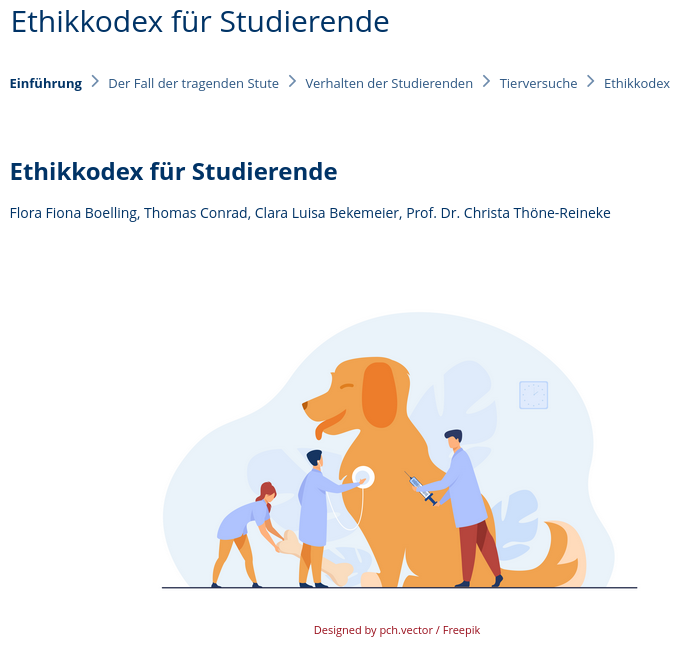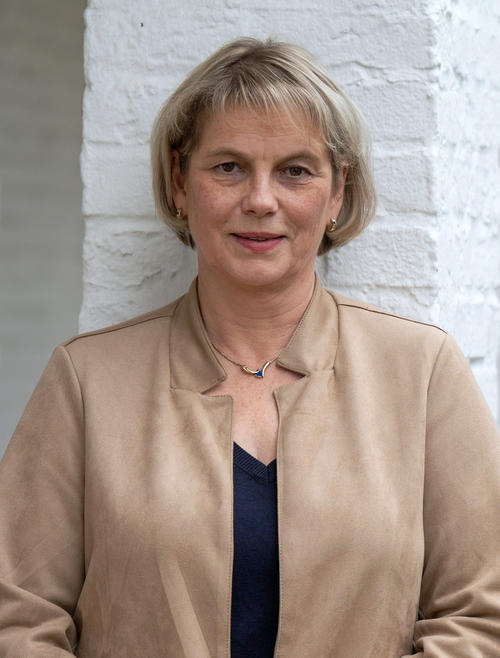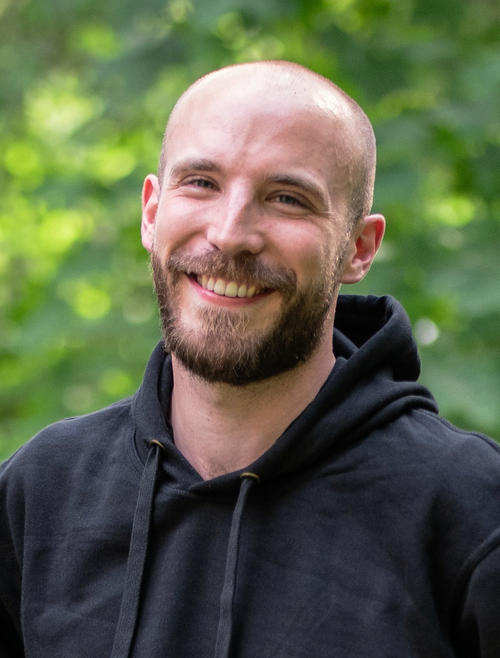A code of ethics by students for students
Prof. Christa Thöne-Reineke und Prof. Diana Meemken stellen den Ethik-Kodex der Studierenden beim Tag der Lehre vor.
Thomas Conrad entwickelte mit zehn weiteren Studierenden den neuen Ethik-Kodex
At the School of Veterinary Medicine's teaching day on May 25, Prof. Christa Thöne-Reineke, director of the Institute of Animal Welfare, Animal Behavior and Laboratory Animal Science and animal welfare officer at Freie Universität, and Prof. Diana Meemken, Institute for Food Safety and Hygiene, working group for Meat Hygiene, presented a Code of Ethics that has never been seen before in Germany. Participants in her elective subject formulated their ethical standards as students of Veterinary Medicine in ten points.
Thomas Conrad, one of the eleven students involved, and Christa Thöne-Reineke answered questions about the motivation and reason, as well as critical situations and discussion points relating to the new Code of Ethics.
News from Jun 06, 2023
Ms. Thöne-Reineke, for what reason or occasion did you offer this elective course?
Christa Thöne-Reineke: There were actually three reasons. Firstly, I knew that we needed something like this since an incident that happened when I was still relatively new at Freie Universität. Back in 2016, students had reported the department to the Veterinary Office without having consulted it beforehand. That really surprised me. It really was a very unpleasant case at the time, which was very upsetting for the students, but it was handled correctly in legal terms. And at the time, I would have liked them to talk to the faculty about it first before filing a complaint.
You can read about the case back then in the Tetfolio.In addition, the clinicians repeatedly report that students are appalled by the conditions in which farm animals are kept on some of the farms they visit during the excursions. Some students, most of whom have had no previous contact with agriculture, want to go directly to the public health officer and report the farms without having to report anything legally because they were not familiar with the situation.
The third point in this context is the slaughterhouse internship, which fewer and fewer students want to complete. However, as this is compulsory, there is always resentment, a lack of understanding and the impulse to report the company.
Given this dilemma, it was a matter close to our hearts to tackle this topic. On the one hand, we wanted to develop principles together with the students and, on the other, we wanted to show all students an uncomplicated and - if they wish - anonymous way to report suspected animal welfare violations.
Thanks to the elective subject, there is now a decision-making aid for assessing potential animal welfare situations as well as an online reporting form.Who was involved and what was the course about?
Christa Thöne-Reineke: The course was offered in the summer semester 2021 as a compulsory elective for the 6th semester by Prof. Diana Meemken from the Institute of Food Safety and Hygiene, who also supervises the slaughterhouse internships, PD Dr. Carola Fischer-Tenhagen for the area of practice and excursions and myself. In a general part, we raised awareness of the topic of animal testing, 3Rs etc.. Because every student must be aware that training on animals during their studies is an animal experiment.
You can find more information about the 3R approach (Replace, Reduce, Refine), the ethical tension, the legal framework and the animal welfare activities of Freie Universität Berlin here.
After we had introduced the three areas, the students split up into expert groups of three to four people according to their interests. They exchanged rough ideas, formulated goals, collected and reviewed materials on past cases as well as existing codes of the German Veterinary Association and the German Veterinary Association for Animal Welfare. In the middle of the course, everyone came together again for an exchange, feedback and discussion.
Later, of course, the question arose as to how we could make this accessible to students. I was pleased that Fabienne Eichler, a research assistant in the Dean's Office for the VetCam Berlin project, supported us here. With her help, the students created a great learning unit on our Tetfolio platform.
In Tetfolio, students can now explore the topic of the Code of Ethics on 26 pages. Starting with the question “What is ethics anyway?”, through real cases from the past, information on laboratory animals and 3Rs, to the students' code of ethics and an anonymous reporting form - all interspersed with a variety of quiz questions.
 |
Mr. Conrad, what motivated you to approach this topic as a student?
Thomas Conrad: I was familiar with the codes of ethics from the German Veterinary Association and the German Veterinary Association for Animal Welfare. But because there was no such thing tailored for students, I found it really exciting to work on it and draft something like this. I also used practical examples from the past. I also knew students who had already been to a slaughterhouse at the time and had seen animal welfare violations there, but had problems addressing them. That's another reason why I thought it was really important to get involved and establish a contact point.
I have now also completed the slaughterhouse internship and I have to say that it was a very special experience. We were well prepared by Ms. Meemken in terms of meat inspection, the slaughter process, etc., but it really isn't a wonderful place. It's meat production on an industrial scale and vets are needed there too. But the internship is also an enrichment. Who gets to go to a slaughterhouse in their life?
I was also motivated by the realization that I often come into contact with very extreme opinions, both inside and outside of my studies. You hear animal welfare organizations saying that animal testing and animal husbandry in general are terrible. And then you come into contact with exactly the other side during your studies or when talking to farmers. That's why I thought it was important to formulate something that helps us to understand all sides, but then to come to our own conclusion about what really makes sense for us using all the scientific facts that we are taught in veterinary studies. Both parties have arguments, but farmers need to make some significant improvements in animal welfare. And demands for a general abolition of animal husbandry, i.e. these very extreme husbandries, don't make sense either. You simply have to recognize social realities. And that was important to me, to be part of the process and to formulate this.
Now it's written down and all students can deal with it, a basis for discussion has been created
Were you able to agree on the principles quickly within the course? Which points took longer to discuss?
Thomas Conrad: There were definitely different opinions and we discussed them back and forth a lot. In fact, also on points such as the reduction of animal experiments in studies, working with live animals, etc.. In the end, we agreed that if it doesn't affect the quality of teaching, we think it's great to be able to work on models. Eleven opinions from eleven students had to be brought to a common denominator and it took some time before we were able to agree on the final wording. Because many of them actually think it's good and right that we are trained on live animals. As exhausting as the discussions were, they were also enriching. Ultimately, it was all about exchanging ideas and agreeing on wording that everyone could support.
There are also social topics in which we as veterinary students can contribute our expertise and which we have therefore included in the Code, e.g. ecological topics such as the impact of livestock farming. We had a lot of discussions about whether this topic should be included in the Code or not, but we decided to include it because as (prospective) veterinarians we represent an important point of intersection in society. As I mentioned briefly, we are a bit in between on this topic and can communicate with both farmers and climate movements. I think that we have a great position as veterinary students or as vets to be able to explain this on a scientific basis, to find points of intersection and also to be able to communicate a little.
Have you yourself experienced critical situations during your studies?
Thomas Conrad: Yes, that was during the slaughterhouse internship. I found it helpful that, thanks to Ms Meemken, we were made aware of how we could deal with it through the explanations of the notification form etc. In my case, animals were delivered to the slaughterhouse that simply didn't look good, they weren't doing well, that was very obvious. That was a step in itself, to first consult with the official veterinarian on site and ask what could be done and why this had not been prevented. I was able to clear that up quite well with the process. The guidance definitely helped me.
How do the students find out about the code and the reporting form?
Christa Thöne-Reineke: After the Student Code of Ethics was submitted to the Faculty Council via the Dean's Office some time ago and adopted there, the documents can now be found both on the faculty website and in the Tetfolio, which all students have access to. It will also be discussed in the welcome events during Freshers' Week and in my lectures on animal welfare, ethics and law in the 2nd and 4th semesters. In the 8th semester, Ms. Meemken will take it up again in her department.
Thomas Conrad: We deliberately wanted to start the Tetfolio from scratch, so we didn't assume any major prior knowledge. This means that every student can deal with it at any point during their studies and take a critical look at ethics in general and the ethical problems that may arise from animal experiments or any work on animals, animal welfare and also how we treat each other.
What would you like to see in the future?
Thomas Conrad: I would like the Code of Ethics to continue to be worked on and to adapt to the situation and the progress we will have in many areas when 3R takes effect and is accepted and these three points have really become established. That is the goal and it would be great if we could continue to improve.
Christa Thöne-Reineke: I would go one step further: I would be delighted if the Code of Ethics is not only read and understood from now on, but also lived. That anyone who has problems approaches Ms. Meemken or me with this report form and that everyone has the opportunity to find out more about it. It should also be used by students as a good aid, a guide, to help them get into their studies and feel comfortable.
I am also pleased to have received an invitation from Leipzig and Vienna to present our Code of Ethics by students for students of Veterinary Medicine. Students there have already signaled their interest in the topic. If other universities follow suit, that would be wonderful. So far, there is nothing comparable at other universities.
Perhaps we will have to revise the code again in five years' time because we will then be one step further and then perhaps again in ten years' time, I don't want to deny that, but at the moment it is common sense.
The interview was conducted by Friederike Grasse



